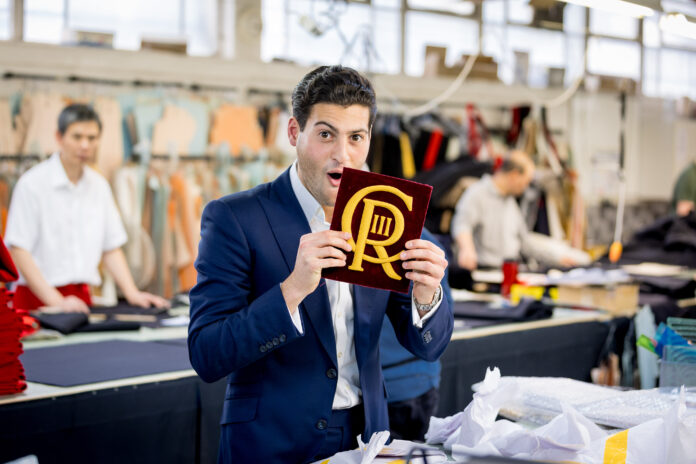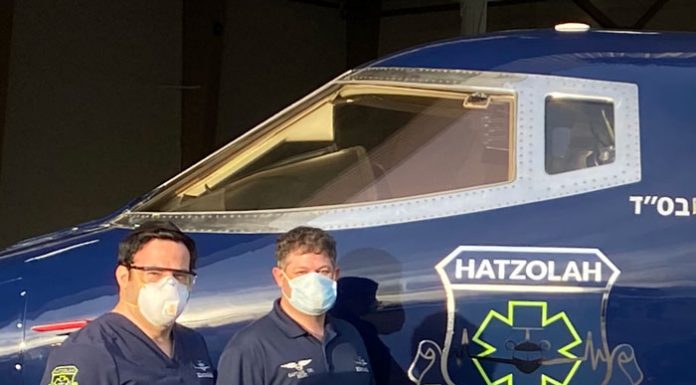Tailoring has long been thought of as a Jewish profession. When we think of the Jewish tailor tasked with making clothes for the royalty, it seems like something out of a tale from centuries ago. But those stories are still playing out in England, particularly with the Jewish-owned company that produces the uniforms and clothing for the British royalty. Surprisingly, they have managed to stay under the radar for decades—until recently.
Kashket & Partners of London, known simply as Kashket, has for several decades been the sole producer of uniforms that are internationally recognized as symbols of the United Kingdom, from the scarlet tunics of the guards outside Buckingham Palace to the uniforms of the Yeomen Warders, otherwise known as the Beefeaters of the Tower of London.
In addition to providing the uniforms for the British Army, Kashket also designs and manufactures the military uniforms for many other countries, including Abu Dhabi, Malta, Gibraltar and more. Clothing is in their very name, as the word kashket (or kasket) means cap in Yiddish.
The Kashket company and family have enjoyed a close relationship with the British royal family for decades. They made both Prince William and Prince Harry’s wedding outfits, and they have long created bespoke clothing and uniforms for the royal family’s special occasions.
Today, the company is run by Nathan Kashket, the fourth-generation Kashket at the helm. Although his father Russel is still involved in the operations of the company, it is Nathan who now leads it, and he is shepherding Kashket into the next wave of success.
Nathan left high school to work at Kashket when he was 16, sweeping floors, packing boxes and learning by observing his father. He kept going, working all the way up the ranks until he reached the very top. Humble and soft-spoken but with the aura of a leader even at his young age, Nathan has already implemented steps to help Kashket become an even larger internationally recognized leader in ceremonial and military clothing manufacturing.
Kashket played a significant role in the May 6 coronation of King Charles III, creating close to 7,000 uniforms for the ceremony.
I spoke to Nathan about the company’s history, his personal rise through the ranks, and some of the behind-the-scenes work involved in preparing for the coronation.
—Nesanel
My family has always worked with the monarchy and the military. Today, of course, I am aware of the magnitude and importance of our work. But growing up, my father never made a big deal of it. I knew we were in fashion, that we manufactured clothes and bespoke (custom) suits. But if anyone at school would ask me what my family business was, I’d reply, ‘We make clothes.’ I truly didn’t know much more than that. It wasn’t until I was about 12 years old, when preparations were underway for the royal wedding of Prince William, that I heard my father mentioned on the news and realized that my family company was a big deal. My teacher asked if my father could come in to give a lecture about what Kashket does. It was news to me and cool to me as well. I started researching military uniforms and of course started asking my parents questions about the company.
“I was born in Ilford, London, and I am the fourth of five boys. My family always celebrated the festivals. I went to local schools as a kid, and for high school, I went to King Solomon High School (an Orthodox school) until I went into the family business.
“As a teenager, I was entrepreneurial. I was always trying to sell things. For example, I’d buy sweets and then sell them. I was also interested in tech; I was even making PowerPoint presentations when I was six years old. I was never after the standard, though. For example, the iPhone didn’t interest me; I’d go for a Motorola.
“Coming from a family of five boys, all I knew was having fun; life was one big roller coaster. At the age of 16, my mother sat me down and said, ‘Nate, I don’t think school is for you. You are really switched on, and I want to throw you into the real world. Let’s take you out of school and see what you are good at.’ I have a great relationship with my parents; I listen to them for advice and I did here as well.
“My mother handles the international side of the business; she said go and work with dad for a few weeks and see how it goes. So off I went at 16. My father has a presence about him, and it was interesting to see him walk around freely, enjoying what he’s doing. My first exposure to the company was when we were doing work for Marks & Spencer, a major British brand. They had a premium run made in the UK, and I was put to work pressing sleeves for nine hours a day. My father told me that I had a good work ethic and that meant a lot to me.
“I swept the floor and did whatever needed to be done at the office. One day, my father told me, ‘If you are going to sweep the floor, you need to do it properly,’ and he showed me how it’s done.
“A number of things that happened to me at 16 have stayed with me. For example, one of my tasks at the company was to go out on errands. One time, I was asked to pick up something from a specific store, but they didn’t have it. When I returned empty-handed, my father told me, ‘You failed at your job,’ explaining that I should have used my intuition and found a store that did have what was needed, instead of simply following instructions to go to that one store.
“None of my brothers are in the business today. Some of my brothers did work in the business to gain general work experience, but I’m the only one who stayed.
“Kashket was founded by my great-grandfather, Grandpa Alfred, who received an MBE (Member of the Most Excellent Order of the British Empire). My great-grandfather worked as a tailor for a small shop and then started off on his own. The British Army liked his work, and he started the company to produce uniforms for the military. His son, my grandfather Bernard, is 87 today and still comes to the factory on Fridays.
“My father helped grow the company significantly through sheer desire, hard work and delivering a quality product. Even when things got tough, he kept going.
“In Great Britain, pageantry is huge, and there are ceremonial events throughout the year. Kashket is fortunate to dress the army, and we are constantly making different uniforms and garments. We also provide uniforms for the Royal Military Academy Sandhurst, which trains princes from around the world. I’ve been building relationships with princes over the past few years.
“We also acquired a metalworks company called Firmin and Sons, which was established in 1655 and makes all the badges, buttons and helmets for the military. In addition to the British military, we provide the metalworks for army uniforms, both ceremonial and operational gear, for 34 different countries.
“We also make clothes for some of the largest blue-chip companies in the UK, such as large chain restaurants and some corporate estates. The majority, though, is for governments. We do the uniforms for police, fire servicemen and ambulance paramedics in the UK.
“When I started out, I shadowed my father for two years to gain experience. Any time we visited the army barracks for fittings (or any other time I would encounter military personnel), I would salute a higher-ranked person every time they walked by. Of course, I am a civilian, but I developed the habit, as I tried to behave like a proper soldier. I remember witnessing soldiers who were being told, ‘Don’t lean on that table, it’s been there longer than you!’ or ‘Stand up straight, boy!’ I would think to myself that I should also stand up straight like the guardsmen, just to make sure I didn’t get called out as well. I always assumed that a senior-ranking officer was thinking, ‘Why is that kid walking around the barracks?’
“Technically, we are still a civilian company, but we are part of the royal family in the sense that we have worked with them for decades.
“My exposure to different parts of the business came pretty quickly. When I was 17, my father called me and said, ‘I just came back from Abu Dhabi. We are redesigning some of their robes and military wear into something brilliant.’ The people my father was talking about own Etihad Airways, the national airline of the United Arab Emirates.
“Although we get a lot of attention for the work we do for the British royals and military, our biggest business is actually international; we have contracts in 45 other countries, including Malta, Gibraltar, Abu Dhabi and nearly every other Middle Eastern country. We also have a good working relationship with Israel.
“The prince of Abu Dhabi asked my father if he has any sons in the company, and when my father told him about me, the prince asked him to bring me along. They flew us out on a luxury plane that had a lounge inside the plane—it was crazy. My father told me not to get used to it, because this is not the normal way of doing business. We had a contract with them for Kashket to do the uniforms and Firmin to do the metalwork accessories. It’s a perfect synergy when they combine like that. I got to meet our CEO and our sales manager, and I felt that I was truly part of the team.
“At the meeting, I watched the team lay out all the different swatches of materials and take into consideration the environment, the heat, the heritage of the country, what the president wants for his country today, and where they want it to be in 20 years. And I’m thinking to myself, ‘Wow, this is what my family does! A full design and development program for anyone—we can do everything.’
“I started to take a real interest in the scope of the business. When I came back home from Abu Dhabi, I went to observe the famous guards with the red scarlet tunics outside Buckingham Palace. I noticed how different guards’ uniforms have different numbers of buttons. People think it’s all the same red jacket that the entire army wears, but there are over 200 different types of red jackets. There are over 50 different ranks in the army, and we produce the uniforms for all of them.
“As I got older and saw how the company runs, I noticed that my father treats the other staff a little bit different. I realized that I have to make sure I’m on my ‘A’ game every time I’m with him.
To read more, subscribe to Ami





















